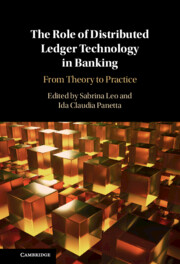Book contents
- The Role of Distributed Ledger Technology in Banking
- The Role of Distributed Ledger Technology in Banking
- Copyright page
- Dedication
- Contents
- Figures
- Tables
- Boxes
- Contributors
- Acknowledgements
- Introduction
- Part I Why Pay Attention to Distributed Ledger Technology in Banking?
- Part II Opportunities and Challenges in Crypto-Asset Regulation
- Part III The Power of Distributed Ledgers in Payments
- 6 DLT in Payments
- 7 Central Bank Digital Currency
- 8 Opportunities, Challenges, and Design of CBDCs
- 9 A Proposal for an Asia Digital Common Currency (ADCC) Applying Distributed Ledger Technology (DLT) and Blockchain Technology (BCT)
- Part IV Enabling Financial Inclusion and ESG with Distributed Ledger Technology
- Part V A Further Look at DLT in Banking: Lessons Learned, Current Applications, and Future Scenarios
- Index
- References
6 - DLT in Payments
New Course of History Ahead?
from Part III - The Power of Distributed Ledgers in Payments
Published online by Cambridge University Press: 26 October 2023
- The Role of Distributed Ledger Technology in Banking
- The Role of Distributed Ledger Technology in Banking
- Copyright page
- Dedication
- Contents
- Figures
- Tables
- Boxes
- Contributors
- Acknowledgements
- Introduction
- Part I Why Pay Attention to Distributed Ledger Technology in Banking?
- Part II Opportunities and Challenges in Crypto-Asset Regulation
- Part III The Power of Distributed Ledgers in Payments
- 6 DLT in Payments
- 7 Central Bank Digital Currency
- 8 Opportunities, Challenges, and Design of CBDCs
- 9 A Proposal for an Asia Digital Common Currency (ADCC) Applying Distributed Ledger Technology (DLT) and Blockchain Technology (BCT)
- Part IV Enabling Financial Inclusion and ESG with Distributed Ledger Technology
- Part V A Further Look at DLT in Banking: Lessons Learned, Current Applications, and Future Scenarios
- Index
- References
Summary
Distributed ledger technology and the resulting crypto-assets have the potential to transform the financial and payments industry by leveraging features of flexibility, transparency, and rapid scalability. The constant evolution and increasing adoption of this innovation, despite cyclical turbulence, is here to stay, requiring greater stability and control in order to scale to levels unexpected just a few years ago. The opportunity in the payments industry is to bring innovation particularly in cross-border, micro- and conditional payments, to which current offerings struggle to respond due to rules, technologies, and business models that need to be evolved. To allow this innovation to fulfil its full potential, it is crucial to address the challenge related to the current high levels of risk and uncertainty and to define a clear and shared regulatory framework between national and cross-border regulators. A key role will be played by intermediaries, in particular qualified and reliable service providers, capable of meeting the needs and protecting all parties involved, private and public. They have the opportunity to be key players in the change, driving responsible, sustainable, and inclusive adoption of the innovation that DLT and crypto-assets are bringing. Nexi is at the forefront in supporting a secure and easy transition to a better society, aiming at distributed inclusion and safeguarding both the interests of all private and public stakeholders and regulatory clarity.
- Type
- Chapter
- Information
- The Role of Distributed Ledger Technology in BankingFrom Theory to Practice, pp. 135 - 154Publisher: Cambridge University PressPrint publication year: 2023

